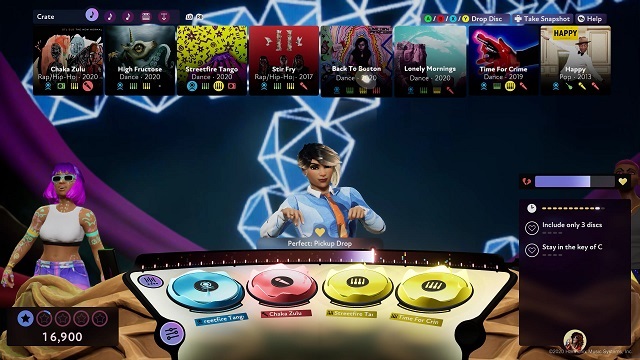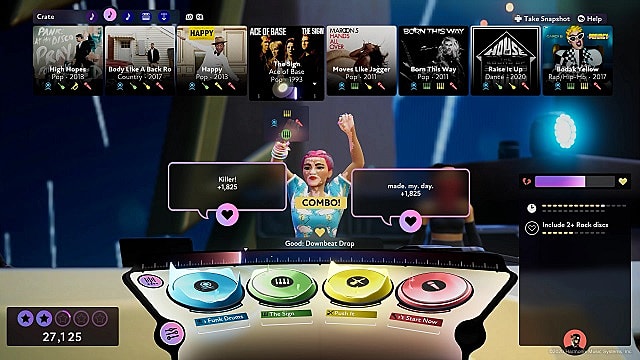FUSER really couldn’t have come out at a better time. What I’m about to say will sound cliche, but it’s true nonetheless. Going to see people play music live, and playing music yourself, is a healing act. There is something special about being in a room filled with people who are there just to hear music. There’s something even more compelling about making music for people who are special to you.
Feeling the power of music in that way is hard right now. The feeling of community that comes from music, just like most other feelings of community now, is heavily filtered and diluted in this post-pandemic world.
FUSER doesn’t fix this problem. How could it? But by rethinking what the heart of a music game should be, FUSER kindles enough of that magic to be something truly, truly remarkable.
FUSER Review: The Next Generation of Music Gaming
[FUSER] does a really great job of teaching players everything they need to know.
FUSER is unlike any music game you have ever played before, and that’s by design. Earlier in the fall, I spoke with Harmonix about their philosophy for the game, and they said in no uncertain terms that the rhythm genre is inherently flawed. No matter how good a rhythm game may be, the fact remains that (with the notable exception of Parappa the Rapper), a perfect score on a certain level will always sound almost exactly the same.
This was the question at the heart of FUSER’s development: is it possible to have a score-based rhythm game that actually allows for true creativity, where no two playthroughs will sound alike?
Harmonix’s answer to that is a mashup-based core gameplay loop that keeps scoring very general. The way it works is this: players fill their crate with a selection of over 100 licensed songs (each of which is broken up into up to four instrumental parts), as well as effects and instruments before taking the stage.
Players drop these instrumental loops onto a DJ deck UI to create bespoke Girl Talk-style mashups. Imagine layering the guitar line from “Killing In The Name Of” with the drums from “Push It” and the iconic vocals of Dolly Parton’s “Jolene.”
Scoring is based on how well you handle audience requests, how often you change up the mix, and how you time everything while doing so. Dropping an instrument loop on the beat earns points, as does triggering effects, ejecting loops, or muting or soloing tracks. You get bonus points for accommodating fan requests, but even these aren’t all that prescriptive. They never force you to revamp your whole mix; they just request a certain instrument, a certain song, or a certain track from a specific decade or genre. It allows for a lot of wiggle room.
What this creates is a scoring system that allows you to create something unique while still getting the deep, base rush of “haha! Yes, number go up!” Not to mention that the unique thing that you’re creating, thanks to a whole lot of brilliant beat and key-matching software, usually sounds amazing (or at least hilarious).
Anyone Can Be a DJ

If juggling all those plates sounds a bit complicated, that’s, well, because it really kind of is. The game’s campaign mode is shorter than Rock Band 4’s by a significant margin, with six unique stages that feature six levels each, but that’s largely because the entire campaign works as an extended tutorial for each of the game’s systems, from the basics of dropping tracks and cueing them to creating custom instrument loops, effects, and filters, recording, sharing and…
Okay, deep breath.
The point is, the campaign mode, although it occupies that uncomfortable space between too-short-campaign and too-long-tutorial, does a really great job of teaching players everything they need to know. And since FUSER is almost as much a digital audio workstation as it is a video game (there’s a robust recording system allowing you to record, edit, and perfect mixes on the fly), that kind of granularity is necessary for players to really be comfortable with everything the game has to offer.
I did have a few issues with the campaign in regards to introductory cutscenes not loading correctly. Still, these were all fixed with a simple restart (and may have already been addressed fully with a pre-launch patch, as I haven’t had the issue since updating).
Mixing With Friends

I didn’t see myself enjoying [competitive multiplayer] when it was first introduced, but I’m hooked.
FUSER‘s core gameplay translates very well both to a weird kind of social co-op play (in this case, defined as playing the game with my fiancée next to me making song suggestions) and actual in-game multiplayer modes.
Co op multiplayer allows you to create a mix online with up to four other players, and it deserves special mention because it really does recreate the deep soul satisfaction of playing Rock Band with friends, except, in this case, everyone is creating something new, unique, and informed by their own tastes. And they’re all doing it together! It’s incredibly special.
There’s also a competitive mode that switches up the core gameplay loop to put you head to head with another player. In these “battles,” each track you lay down has a power value that’s augmented by how good your timing is and how many audience requests you can fulfill with that one track.
Each track on your deck attacks your opponent for as long as it’s active, its power level ticking down every time a global attack timer runs out. If your opponent plays a more powerful track than yours, your track gets ejected from the mix, and you can’t play a track if your opponent has a more powerful one in the opposing slot.
It’s a pretty simple concept, but it takes the plate-spinning FUSER gameplay to the nth degree, upping the intensity level as you try to quickly puzzle out which track to play (and when, and where!) to get an advantage. I didn’t see myself enjoying this mode when it was first introduced, but I’m hooked.
FUSER Review — The Bottom Line
Pros
- The first truly creative rhythm game I’ve ever played
- The song list is terrific so far
- Freeform expression in both gameplay and customization options
- It’s the safest music festival that’ll be held for a while
Cons
- Visual stuttering on Switch
FUSER isn’t a perfect game. Playing both docked and in handheld mode on Switch, I experienced a few stutters that threw a wrench in the rhythm. I also wish there was a separate story mode other than the extended tutorial, in the same vein as Rock Band before it.
But those gripes pale in comparison to the fact that this game is unlike anything else I’ve ever played. It is built on creativity. The character creator allows for expression across the gender spectrum, not locking any creation options, from clothes to dances to body type to male and female categories. Every time you play FUSER, you feel like you have created something new, something special, and something that only you could have made.
If you’re a fan of the rhythm game genre, you owe it to yourself to pick up FUSER. Not only is it a treat on its own, but Harmonix has already begun giving the game a live ecosystem, with live challenges that allow players to create, share, and vote on mixes made under specific constraints to earn in-game rewards.
This game is already something very, very special, and it’s only going to get better as the community grows. After all, it’s always better to make music with friends.
[Note: Harmonix provided the copy of FUSER used for this review.]







Published: Nov 5, 2020 11:26 pm